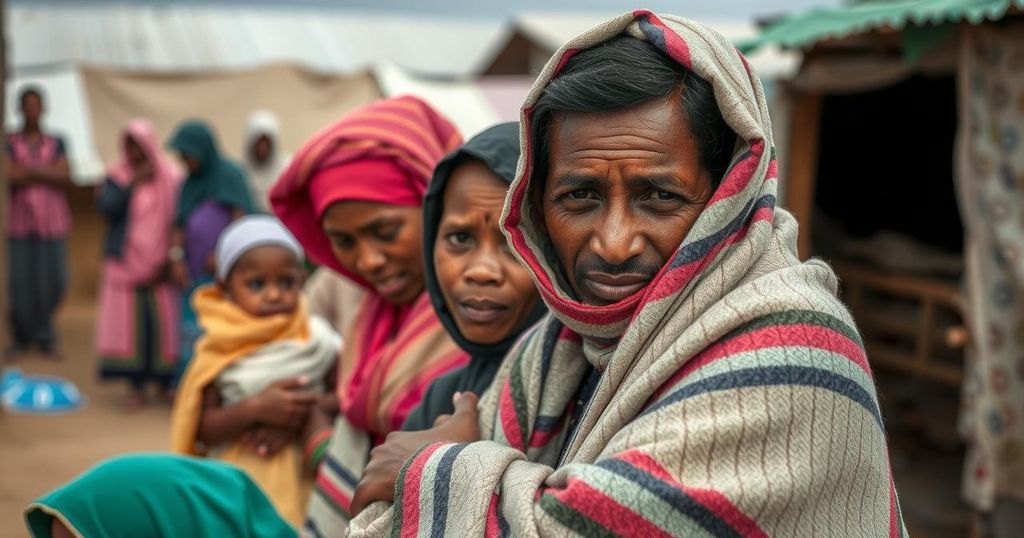World news
AFRICA, AMERICA, ANDREW HARPER, CLIMATE CHANGE, FILIPPO GRANDI, GODDARD INSTITUTE FOR SPACE STUDIES, GRANDI, HINDU, HUMANITARIAN AID, INTERNALLY DISPLACED PERSONS (IDPS, MYANMAR, NATIONAL OCEANIC AND ATMOSPHERIC ADMINISTRATION, NATURAL DISASTERS, SARAH KAPNICK, SOMALIA, SUDAN, UN, UNHCR
Ethan Kim
0 Comments
UN Warns of Deteriorating Refugee Conditions Amid Climate Crisis and Conflict
The UNHCR warns of worsening conditions for refugees due to climate-induced disasters and violent conflicts. The report reveals over 120 million people displaced by conflict and 220 million by environmental calamities. Leaders are urged to allocate funding and implement sustainable responses as the climate crisis exacerbates the refugee situation across developing countries.
A recent report released by the United Nations High Commissioner for Refugees (UNHCR) highlights the alarming conditions faced by refugees, exacerbated by both climate-related upheaval and violent conflicts in their home countries. Filippo Grandi, the Chief of UNHCR, emphasized that extreme weather events such as floods and droughts are increasingly forcing people to flee, with 75% of displaced individuals residing in developing regions that face significant climate risks.
The report reveals that a staggering 120 million people have been forcibly displaced due to armed conflicts, while approximately 220 million have been compelled to move within their own nations due to weather-related disasters. The rising global temperatures, currently at their highest recorded levels, intensify the urgency of this situation, as noted by experts from the National Oceanic and Atmospheric Administration. In light of these conditions, those in low-income countries are critically affected, often relocating to perilous areas with inadequate infrastructure to manage the inevitable impacts of climate change.
At a recent international summit, COP29 in Baku, Azerbaijan, leaders pledged significant funding aimed at supporting affected countries, designating $300 billion for initiatives by 2035, while another ambitious goal has been set to generate $1.3 trillion from diverse sources, including private investment. Furthermore, UNHCR outlines objectives that aim to safeguard vulnerable populations and transition impacted regions to more resilient, climate-responsive strategies.
Activists, such as Najeeba Wazefadost of Refugees for Climate Action, call upon leaders to listen to the stories of those impacted, urging prompt and effective action that fosters resilience and empowers refugee-led solutions as a means to combat this pressing issue.
The ongoing plight of refugees is deeply intertwined with the escalating challenges of climate change and armed conflict. As environmental conditions deteriorate, displacement due to climate shocks has emerged as a critical factor exacerbating the refugee crisis. The UNHCR’s findings reflect a concerning trend: as global temperatures continue to rise—2023 noted as the hottest year on record—countries already vulnerable to social and environmental turmoil face compounded crises. This nexus of climate and conflict highlights the urgent need for targeted intervention and resource allocation to adequately support those most affected.
In conclusion, the UNHCR report underscores the dual challenges faced by refugees stemming from both climate change and violent conflict. With millions displaced and funding severely lacking, the international community must take decisive action to address this crisis. Enhanced support for vulnerable populations and a commitment to sustainable solutions are essential in mitigating the devastating impacts of these interconnected issues. It is imperative that global leaders prioritize the plight of refugees and work collaboratively towards equitable and effective outcomes.
Original Source: www.thecooldown.com




Post Comment